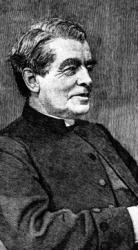Planning worship?
Check out our sister site, ZeteoSearch.org,
for 20+ additional resources related to your search.
- |
User Links
Person Results
John H. Willcox
1827 - 1875 Person Name: J. H. Wilcox Composer of "FABEN" in American Lutheran Hymnal
John H. Willcox
William Henry Monk

1823 - 1889 Composer of "CORONAE" in The Cyber Hymnal William H. Monk (b. Brompton, London, England, 1823; d. London, 1889) is best known for his music editing of Hymns Ancient and Modern (1861, 1868; 1875, and 1889 editions). He also adapted music from plainsong and added accompaniments for Introits for Use Throughout the Year, a book issued with that famous hymnal. Beginning in his teenage years, Monk held a number of musical positions. He became choirmaster at King's College in London in 1847 and was organist and choirmaster at St. Matthias, Stoke Newington, from 1852 to 1889, where he was influenced by the Oxford Movement. At St. Matthias, Monk also began daily choral services with the choir leading the congregation in music chosen according to the church year, including psalms chanted to plainsong. He composed over fifty hymn tunes and edited The Scottish Hymnal (1872 edition) and Wordsworth's Hymns for the Holy Year (1862) as well as the periodical Parish Choir (1840-1851).
Bert Polman
William Henry Monk
Thomas Olivers

1725 - 1799 Author of "The Last Judgment" in The Cyber Hymnal Thomas Olivers was born in Tregonan, Montgomeryshire, in 1725. His youth was one of profligacy, but under the ministry of Whitefield, he was led to a change of life. He was for a time apprenticed to a shoemaker, and followed his trade in several places. In 1763, John Wesley engaged him as an assistant; and for twenty-five years he performed the duties of an itinerant ministry. During the latter portion of his life he was dependent on a pension granted him by the Wesleyan Conference. He died in 1799.
--Annotations of the Hymnal, Charles Hutchins, M.A., 1872.
==================
Olivers, Thomas, was born at Tregynon, near Newtown, Montgomeryshire, in 1725. His father's death, when the son was only four years of age, followed by that of the mother shortly afterwards, caused him to be passed on to the care of one relative after another, by whom he was brought up in a somewhat careless manner, and with little education. He was apprenticed to a shoemaker. His youth was one of great ungodliness, through which at the age of 18 he was compelled to leave his native place. He journeyed to Shrewsbury, Wrexham, and Bristol, miserably poor and very wretched. At Bristol he heard G. Whitefield preach from the text "Is not this a brand plucked out of the fire?" That sermon turned the whole current of his life, and he became a decided Christian. His intention at the first was to join the followers of Whitefield, but being discouraged from doing so by one of Whitefield's preachers, he subsequently joined the Methodist Society at Bradford-on-Avon. At that town, where he purposed carrying on his business of shoemaking, he met John Wesley, who, recognising in him both ability and zeal, engaged him as one of his preachers. Olivers joined Wesley at once, and proceeded as an evangelist to Cornwall. This was on Oct. 1, 1753. He continued his work till his death, which took place suddenly in London, in March 1799. He was buried in Wesley's tomb in the City Road Chapel burying ground, London. Olivers was for some time co-editor with J. Wesley of the Arminian Magazine, but his lack of education unfitted him for the work. As the author of the tune Helmsley, and of the hymn “The God of Abraham praise," he is widely known. He also wrote “Come Immortal King of glory;" and "O Thou God of my salvation," whilst residing at Chester; and an Elegy on the death of John Wesley. His hymns and the Elegy were reprinted (with a Memoir by the Rev. J. Kirk) by D. Sedgwick, in 1868.
--John Julian, Dictionary of Hymnology (1907)
Thomas Olivers
William Bobo
1814 - 1887 Composer of "LONG SOUGHT HOME" in The Southern Harmony, and Musical Companion (New ed. thoroughly rev. and much enl.) William Bobo was born in New Prospect, Union County, South Carolina and lived in Cross Keys. He was the nephew of B. F. White. He served as deacon, chorister and Sunday school superintendent at Padgett's Creek Baptist Church. He was buried at Padgett's Creek. His tune, LONG SOUGHT HOME, appeared in the 1847 edition of Walker's Southern Harmony
Dianne Shapiro, from The Makers of the Sacred Harp by David Warren Steel and Richard H. Hulan (Urbana: University of Illinois Press, 2010)
William Bobo
Samuel Reynolds Hole

1819 - 1904 Person Name: Samuel R. Hole Author of "Sons of Labor, Dear to Jesus" in The Cyber Hymnal Hole, Samuel Reynolds, D.D., born at Ardwick, near Manchester, Dec. 5, 1819, and educated at Brasenose College, Oxford; B.A. 1844; D.D. by Abp. of Canterbury, 1887. He was Curate of Cannton, Notts, 1844-1850, and Vicar 1850-87. In 1887 he became Dean of Rochester. Previous to this he had held several important appointments. He has published some prose works, including Hints to Preachers, &c, 1880; A Book about Roses, 1869, &c. His hymn, "Sons of labour, dear to Jesus" (Working Men's Service), appeared in the 1889 Supplemental Hymns to Hymns Ancient & Modern. Died Aug. 27, 1904.
--John Julian, Dictionary of Hymnology, Appendix, Part II (1907)
Samuel Reynolds Hole


 My Starred Hymns
My Starred Hymns



